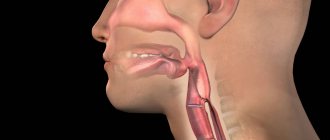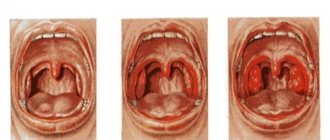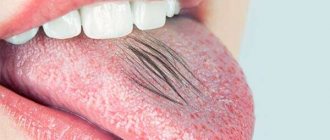Determination of saliva viscosity
The level of saliva viscosity is determined by a person based on personal feelings. The laboratory will use a viscometer. At home, you can also tell if there is thick saliva in your mouth or if it just seems so. The procedure is carried out using a 1 ml pipette:
- The pipette is filled with water and positioned vertically. It is necessary to record the volume of liquid leaked in 10 seconds. These data are recorded and the experiment is repeated 3 times to ensure the reliability of the result.
- To get the average result, leaked water, you need to sum up all the numbers and divide by 3.
- The volume of saliva is also calculated in a similar way. Liquid should be taken from the mouth on an empty stomach in the morning. The experiment is carried out three times, the average is obtained by dividing the sum by 3.
The ratio is compared to the average ratio of water to saliva. Ideally, the result may differ by 1-4 units. If the number is more than 5, then you should pay attention to other symptoms of the body that can indicate the disease that caused such a change in viscosity.
Prevention of increased viscosity and thickness of saliva
Excessively thick saliva is, of course, not fatal, but very unpleasant. Therefore, having experienced this disease once, people are afraid of its recurrence. In order to prevent relapse, it is enough to follow simple preventive measures.
First of all, you need to pay attention to the amount of liquid you drink. Its volume must be at least 1.5 liters. It is advisable to add ice or papaya juice to the water, which contains papain, which thins saliva well.
Having a history of such a disease, you will have to completely give up cigarettes, strong alcoholic drinks and coffee. Dairy products also contribute to the depletion of saliva, so you will need to reduce the amount of them in your diet, or after consuming them, balance the pH in the mouth with juice or chewing gum.
Additional symptoms requiring attention
Viscous saliva in the mouth often appears on its own. If there are health problems, then other unpleasant symptoms will be present:
- the functioning of taste buds is disrupted - taste disappears partially or completely;
- there is discomfort in the throat, pain when swallowing;
- the smell from the mouth becomes unpleasant, reminiscent of rotten meat;
- cracks form in the corners of the mouth, lips dry out;
- a burning sensation appears in the tongue area, it hurts to move it.
A specialist will tell you why these signs appeared. A detailed diagnosis will help you choose the right therapy. First, you will have to visit a therapist who will prescribe the necessary tests.
Thick saliva in the throat
Saliva can not only foam, but also seem to get stuck in the throat. In this case, it is necessary to examine an ENT doctor for damage to the tonsils and larynx. Purulent forms of tonsillitis or tonsillitis are accompanied by the appearance of plaques on the tonsils, which create discomfort and pain, and when opened, they release purulent contents into the pharynx, increasing the saturation of sputum.
If your throat is constantly dry, and your drool changes color and consistency, then this may be a symptom of diseases of other organs. Additional signs confirm the presence of a problem: burning sensation, hardness of the tongue, cracks, strong odor from the mouth, sore throat, impaired taste.
Diagnosis during viscous saliva
The doctor will determine the cause of this condition by examining the results of tests and medical procedures:
- palpation of the thyroid gland, lymph nodes and examination of the oral cavity;
- general blood analysis;
- culture of sputum for bacterial content;
- X-ray – prescribed if the patient has a displaced nasal septum;
- laryngoscopy – allows you to assess the condition of the larynx;
- FGS and ultrasound - procedures are necessary to examine the digestive organs.
After receiving all test results, therapy is prescribed. It is possible that the treatment will be carried out by a highly specialized specialist - ENT, gastroenterologist, oncologist or others.
Common causes of stringy saliva
There are many diseases, the symptom of which is viscous drool. Viscous saliva indicates that harmful microorganisms are actively multiplying in the body. This may also be a signal that some kind of pathology is developing.
Here are the main reasons for increased saliva viscosity:
- Sinusitis is a chronic pathology of the paranasal sinuses. In addition to thick saliva, there is an unpleasant odor from the mouth and swelling of the nose. If measures are not taken, headaches and fever will occur.
- Xerostomia is a disorder of the salivary glands. The patient also complains of a burning tongue and excessive dryness, accompanied by a sore throat.
- Fungal candidiasis - a disease that occurs after long-term use of antibiotics. This disease also manifests itself if a person has diabetes or HIV.
- Diseases of the tonsils - tonsillitis, laryngitis or pharyngitis. A sore throat and high temperature are added to the ailments.
- Periodontitis - gum damage is often accompanied by depletion of saliva, it becomes white.
- Acute infections - patients complain of abdominal discomfort and diarrhea may occur.
These are the main reasons why saliva in the mouth becomes excessively viscous. The clinic will be able to accurately establish a diagnosis and prescribe competent therapy.
The viscosity of salivary fluid may also increase if a person has the following diseases or pathologies:
- increased acidity of gastric juice . As a defense against acid, the salivary glands begin to actively increase viscosity;
- disturbances in the functioning of the endocrine system - problems arise during pregnancy or while taking hormonal drugs;
- dehydration of the body - this can happen due to poisoning or while following a strict diet. For normal functioning of the body, a person should drink at least two liters of fluid per day;
- dry air – if the condition manifests itself indoors, you should purchase a humidifier;
- allergic reaction to pollen or food;
- taking medications . Before starting therapy, you should always read the instructions. The “side effects” section may say that viscous saliva is normal when taking a certain medication;
- smoking is a common phenomenon that doctors call “a feeling of a lump in the throat”;
- diabetes mellitus - the viscosity of saliva may increase in the second stage of the disease.
After determining exactly why the viscous saliva appeared, the person is prescribed treatment. Therapy may include taking pharmaceutical drugs or using traditional medicine methods.
Deviations in the composition of saliva. Reasons for increasing its viscosity
Human saliva is 96-99% water. The rest consists of various enzymes, salts, acids and trace elements. If their concentration increases, the viscosity of saliva may change. Too thick saliva not only causes discomfort, but also cannot fully cope with its functions: digestion and disinfection.
The cause of thick saliva is usually some kind of disease. Most often, the doctor diagnoses xerostomia. It is characterized by a sharp decrease in the amount of saliva, an increase in its thickness, dry mouth, thickening of the tongue and mucous membranes. Another “dental” cause of viscous saliva is various forms of candidiasis and stomatitis, especially in chronic form.
Quite often, this phenomenon can be found against the background of acute respiratory infections or acute respiratory viral infections, as well as tonsillitis, tonsillitis, sinusitis or laryngitis. If none of the above reasons are confirmed, then the doctor will prescribe a consultation with a gastroenterologist and endocrinologist, since gastritis, ulcers, and various hormonal imbalances can also cause an increase in the viscosity of the secretion of the salivary glands.
However, it is worth knowing that in addition to serious diseases, thickening of saliva can be caused by a number of external factors, including prolonged exposure to dry air, smoking, thirst, and exposure to an allergen. In addition, the mucous membrane can dry out during a normal runny nose, when you have to breathe through your mouth for a long time.
Treatment of viscous, stringy saliva with drugs from the pharmacy
Viscous saliva is a symptom of the disease, which is taken into account when making a diagnosis. Depending on the disease that worries the person, the drug is prescribed. Effective therapy is a set of measures aimed at eliminating the underlying problem. If it is necessary to relieve irritation in the mouth and pharynx, and also to thin saliva, the following medications are taken:
- Reflex action - they act on nerve endings, provoking the production of saliva. After taking the medications, patients note that the cough caused by irritation of the throat goes away, and the sputum ceases to be thick. Medicines with this effect include Alteyka, Stoptussin and Thermopsol.
- Mucolytic - they dilute sputum, but do not increase it quantitatively. In the prescription of therapists you can see Ambroxol, Mucaltin or Linex.
- Resorptive medications - reduce viscosity by increasing the amount. The drugs should not be given to children under 7 years of age.
Drug therapy is combined with procedures that can reduce saliva viscosity:
- rubbing;
- rinsing;
- compresses;
- inhalation.
These actions should be carried out only after communicating with the doctor. The specialist will give useful recommendations and protect you from mistakes. For example, inhalation is prohibited if the patient has a high temperature. Rubbing is done only before bedtime, and active ointments should not be applied to the area near the heart.
Why is saliva viscous and stringy?
A symptom such as thick drool often causes dehydration due to insufficient fluid intake and intoxication , accompanied by vomiting and diarrhea. In addition, the cause of thick saliva may lie in the side effects of medications. Diuretics and choleretic drugs, antihistamines and antidepressants, as well as a number of painkillers, radiation and chemotherapy can cause malfunction of the salivary glands. In these cases, stopping or replacing the drug is enough to solve the problem.
Experienced smokers often experience dry mouth mucous membranes, which is accompanied by the appearance of viscous, sticky saliva. For some, such a violation accompanies them until they completely give up the bad habit.
What to do if the thickness of saliva increases due to allergies?
An allergic reaction is also an unpleasant disease.
Many people do not give the disease the importance it deserves. If you do not get rid of the problem, the allergy will develop into a chronic form. During therapy, antihistamines are prescribed - Fenistil, Suprastin or Claritin. The desired result will be difficult to achieve if you do not stop contact with the object that causes a negative reaction. Plants, dust or food can trigger allergies. If measures are not taken, swelling of the larynx may occur, which will lead to respiratory arrest.
- Sticky phlegm in the throat does not go away - how to get rid of it;
- See here the causes of phlegm in the throat - where it comes from;
- Phlegm in the throat without coughing - reasons for how to treat it in a child: .
Traditional therapy to help
For several decades there has not been such an assortment of pharmaceutical products. I had to use improvised raw materials for treatment. Some methods are still relevant today. Here are recipes that you can use if the saliva in your mouth is too thick:
- Agave juice or using plant pulp . Aloe has long been considered an effective product for the treatment of coughs that produce thick sputum. For therapy, you need to take the pulp and grind it with honey. Or you can simply squeeze out the juice and drop it into the nasal cavity.
- Calendula decoction with honey . A preparation is prepared from fresh petals of the plant; they must be poured with boiling water. After infusion, the tincture is mixed with honey. The drink can be drunk after meals.
- Sea salt rinse.
- Radish juice with honey is an effective recipe when there is no relief from too thick phlegm.
- Inhalations using potatoes . The vegetable is boiled in its peel, the patient is seated in front of a pan with root vegetables. It is necessary to inhale the vapors, preferably under a blanket.
- A decoction of chamomile with honey is an excellent option when you need to get rid of phlegm clots and boost immunity.
- Milk with honey or butter . The procedure is carried out before bedtime. It is enough to drink one glass of warm milk with additional ingredients.
When choosing traditional therapy for the treatment of viscous sputum, you should pay attention to the composition of medicinal decoctions and drinks. Honey is a strong allergen, so it should not be given to people who have a negative reaction when coming into contact with bees and bee products.
You cannot resort to “grandmother’s” methods without consulting a doctor. There are pathologies that cannot be cured without pharmaceutical drugs.
Sometimes hospitalization is required, and self-medication only makes the situation worse. Therapy should be carried out especially carefully in young patients. The child's body is sensitive to any disease. Illiterate therapy can provoke chronic health problems.
How to relieve the condition when saliva is viscous and stringy
A person whose saliva thickens and foams experiences a lot of unpleasant sensations. In addition to discomfort, outbreaks of diseases of the throat, tongue, and gums may become more frequent, and teeth become more vulnerable to caries. Therefore, this symptom must be eliminated using conservative and traditional methods of treatment.
Having determined why the saliva in the patient’s mouth has become thick and viscous, the doctor will prescribe treatment for the underlying disease that caused xerostomia, as well as auxiliary local methods that will help quickly return to normal life:
- artificial saliva;
- various oral moisturizers in an easy-to-use form (gel or spray);
- specialized rinses;
- special chewing gum and lollipops;
- drinking plenty of fluids.
Folk remedies for the treatment of xerostomia include sage or fenugreek tea, lubrication of the oral cavity with a mixture of peach oil and propolis, and inhalations with eucalyptus. But it is better to discuss these treatment methods with your doctor.
It would not be superfluous to purchase an air humidifier for the room and give up tobacco, alcohol, soda and coffee, which additionally dehydrate the mucous membranes. The consumption of dairy products will also have to be minimized. The daily volume of clean water consumption should be at least one and a half liters. During this period, it is better to choose a toothbrush with soft bristles so as not to injure dehydrated gum tissue.
Don't wait until unusual sensations in your mouth develop into unbearable ones. The viscosity of saliva is one of the serious indicators of the health of the body. If it deviates from the norm, action must be taken.









